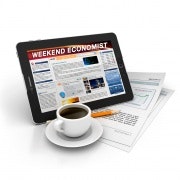WEEKEND ECONOMIST: Business poised for growth
In a week that was quite devoid of economic data the June quarter Westpac-ACCI Survey of Industrial Trends stands out as the only real update on the state of the Australian economy.
The survey, which is quarterly, covers a respectable sample of around 300 manufacturing companies. The survey has been conducted on a quarterly basis since the 1960's and has therefore allowed us to track a number of economic cycles. Being such an established survey it has considerable advantages over the other business surveys, which were established in the 1990's and 2000's.
Westpac has constructed a range of indices from the survey results which we believe have useful lead relationships with employment growth, private final demand and business investment. These are the key decisions for firms. A good business survey will provide stable indicators which have demonstrably performed over multiple cycles on these issues.
The headline index is our Actual Composite Index which is a weighted composite of individual categories – employment (20 per cent); new orders (30 per cent); output (25 per cent); orders accepted but not delivered (15 per cent); and overtime (10 per cent). This weighting concept and the weights themselves are similar to the Indices used in the ISM's, which are so influential as data signals for the US.
The Labour Market Composite Index uses weights as follows: actual employment (41 per cent); expected employment (22 per cent); actual overtime (28 per cent); and expected overtime (9 per cent).
The latest survey was conducted during the post Budget and Henry Tax review period. It was closed just after the RBA's decision to keep rates on hold following the Board meeting in June.
The survey printed only a minuscule fall in the Actual Composite Index. That indicated there was little change in trading conditions in the June quarter relative to the March quarter. The level of the Composite Index was 56.6, well above the decade average of 52.1 and the second highest since the first quarter of 2008. It remains consistent with a pick-up in the growth rate of private final demand from the current 2 per cent per annum (through the year) to at least 4 per cent per annum over the next year (close to Westpac's forecast of 4.4 per cent for 2010) and a pick-up in plant and equipment investment growth from the current 0.6 per cent to around 15 per cent over the next year (Westpac's forecast is 13 per cent).
The survey printed a near steady read on the labour demand indicator, falling by 1 point from 8 to 7. That is still the second highest level since the fourth quarter of 2007 and above the decade average of 5. The indicator remains consistent with a pick-up in annual jobs growth from 2.5 per cent in May to 3 per cent through the second half of 2010 – in line with Westpac's forecast and consistent with an unemployment rate by year's end of 4.9 per cent.
These indicies are an important input to our forecasting process and send consistently reliable signals over multiple cycles.
We are less convinced of the reliability of the direct confidence measures in the survey. For businesses these tend to reflect what is assessed from the media rather than what is actually going on in their own businesses. We expect that behaviours are much more influenced by how managers assess the performance of their own businesses rather than a "confidence" measure.
For the record, the results from the Survey for the confidence measures were considerably weaker, although remained above decade averages. How people assess the General Business Situation fell to a net level of 13, down from 30 in the March quarter, and a recent peak of 42 in the September quarter last year. The thee-month Expectations measure of the Composite Index fell from a record 64.7 in March to 54.8 in June.
That March read looked excessively high at the time – the Expectations Composite is much more volatile and, accordingly, less reliable as a leading indicator of the real economy than the Actual Composite.
Bill Evans is chief economist at Westpac.
















